“Guinea Pig Chirping and Other Signs of Stress”
Have you heard your guinea pig making a chirping sound?
Watch this short video for an explanation of this interesting guinea pig sound!
Guinea Pig Chirping - A sign of stress?
Have you heard a sound like a bird chirping at night, but coming from your guinea pig’s home? Guinea pig chirping is a relatively rare and mysterious sound to hear, and though there’s some debate on its meaning, the current consensus is that it may be your guinea pig’s way of communicating stress or uncertainty.
As you probably know, guinea pigs have evolved to be incredibly social animals, depending on each other for companionship, social lessons, food tips, and more. As social creatures, or herd animals, guinea pigs rely heavily on their various forms of communication and information sharing. Similar to humans’, one of guinea pigs’ preferred methods is verbal communication, using a number of different sounds to share information with their herd and stay abreast of possible threats.
When your guinea pig encounters an unknown sound, smell, or presence, they’re likely to be cautious and on guard while they try to suss out the potential threat of danger. By “chirping”, very much the same way birds will chirp back and forth to one another in a tree, your guinea pigs are likely alerting their friends to be attentive, as something in their environment has changed, and there is currently an unverified potential threat.
When guinea pig’s feel more certain of a threat and become afraid, they’ll often purr or shriek, accompanied by the guinea pig’s most preferred defense mechanism: running away and hiding!

We’ve said it many times before, but as prey animals, and when nature has made you this soft and sweet, your best bet for survival is to flee in the face of any danger or uncertainty.
This behavior is all relatively normal for guinea pigs, allowing for some variation based on individual personality traits. Certain health concerns begin to arise, however, when guinea pigs are unable to flee or hide when they feel afraid or in danger, when the scary or startling situations become frequent or unrelenting, and when guinea pigs are unable to rest and appropriately recover from frightening or traumatic situations.
Prolonged Stress:
Guinea pigs and humans are obviously very different creatures in many ways, but one way that we are all similar is that we all share a need to recover from stressful situations, or our health is likely to suffer.
Provided our hearts are healthy and our blood pressure is under control, short bursts of fear and the accompanying adrenaline are not shown to be detrimental to health and well-being. In humans, these bursts of fear, followed by a release of the tension, can even be enjoyable (to some), and carry small cardiovascular boosts, like a very brief sprint. Laughter in primates has often been linked to alerting others of a false alarm, or an initially perceived threat, that’s not actually a concern.
“Nevermind, everyone! It was just my shadow again! There’s no intruder after all!”
Laughter, in this case, is a physical release of stress, as well as an emotional reframing of the previous surprise or fear, allowing everyone to relax. If you’ve ever heard the expression “Laughter is the best medicine,” it’s likely referring to this effect of neutralizing stress.” This is because while short bursts of fear are okay, living in a persistent state of tension and anxiety can have a costly effect on physical and mental well-being. Without the de-stressing effect of a threat being neutralized, our bodies will consistently use up their stores of adrenaline, leaving us exhausted. Unfortunately, an overly excited autonomic nervous system will continue scanning for possible threats, interrupting our sleep, spiking cortisol levels, and making recovering and returning to a healthy stasis nearly impossible. Our body’s pH scale skews toward acidic, inflammation ensues, and diseases may follow. This is why they say “Stress kills.” In actuality, “Relentless stress with no recuperation depletes our immune systems, poor immune systems don’t battle infections and diseases well, and infections and diseases kill.” All this is to say that prolonged stress (external and internal stresses) can adversely affect the health of any creature, especially those who are easily scared, like guinea pigs.
In order to address a worrying condition, it’s first important to recognize the signs. Below are some of the indicative sounds, like chirping, as well as behaviors that may suggest your guinea pig is feeling stressed. After that, we’ll discuss some possible remedies to help your anxious little ones relax.

Indicative Sounds:
Chirping - Intermittent chirps or consistent chirping from your guinea pig implies that they’re feeling uneasy. They’re not in full-blown panic-mode yet, but the alert systems have been raised.
Speaking in a calm voice and removing or demystifying any perceived threat is the way to go to de-escalate your piggy’s concerns.
Purring - Unlike with cats, when a guinea pig purrs, it sounds more like a low grumble, and this usually means they’re afraid. Calmly reassuring your guinea pig is important here, and allowing them a quiet, private space to regroup is the best idea.
Shrieking - Shrieking occurs when your guinea pig feels terrified. A perceived life-or-death situation is occurring (at least from their perspective), and their little bodies are pumping out adrenaline to help them get to safety.
Remember that this state of fear should not be detrimental to the long-term health of most guinea pigs, as long as the perceived threat is removed and not permitted to continue arising. An excitable dog may scare a guinea pig, but a dog that is frequently allowed to invade your guinea pig’s space and scare them is what will cause lasting anxiety.
Remove the noise/perceived threat, speak gently and reassuringly, and provide your piggy with a safe and private place, allowing them to reemerge once they’ve recovered.
Indicative Behaviors:
- Hiding a lot and refusing to come out of the nest box
- Sleeping a lot & Reluctance to move
- Nervousness
- Aggression or Irritability, including baring teeth, hissing or chattering
- Not wanting to be handled
- Freezing
- Poor appetite
- Head tossing
- Chewing their cage bars
- Over-grooming
- Changing their feeding or toileting habits
- Sitting hunched
- Repeatedly circling their enclosure.
Possible Causes of Stress:
As everybody’s different, with different emotional baggage and triggers, it’s important to keep an eye out for signs of stress from your guinea pigs and respond accordingly.
That said, common stressors for guinea pigs are:
- Loud or scary sounds (like growls)
- Strong smells
- Signs of predators
- Being chased
- Being handled recklessly or against their will
Additionally, below are some common dislikes of guinea pigs, which, if prolonged, can also become causes of stress:
- Being touched in the wrong spots, at the wrong times, or by people/animals they don’t yet trust
- Taking baths
- Changes in temperature
- Having their nails clipped
- Deviating from their routines
- Being annoyed by other guinea pigs
- Traveling
- Unexpected movements & being startled
- Dirty cages
- Dirty hay
Solutions:
As stated above, if your guinea pig is chirping or displaying other possible signs of stress, the first step should be removing any possible stressors from your piggy’s environment and allowing them to regroup in a private, safe space where they feel comfortable. Some water and a favorite treat or snack here is never going to hurt.
Anticipating and addressing sources of stress will be an ongoing part of your life as a guinea pig parent, but as long as your piggy is given the space and safety in which to fully recover from any upsetting incidents, they’re much more likely to stay healthy, resilient, and happy members of your household.
For the best measures you can take to prevent or treat stress disorders in your guinea pigs, just remember:
Diet, Exercise & Play, Privacy, and Sleep (DEPPS)*
(These are true for most shy humans as well!)
The importance of play & exercise:
Playing allows us to explore our curiosities without the fear of negative consequences. Exercise helps our bodies to regulate adrenaline and cortisol levels, and promotes healthy sleep.

Here are some of our favorite toys for guinea pigs, specially designed to promote joy and decrease stress:
https://guineadad.com/products/offbeat-piggy-play-package
https://guineadad.com/products/guineadad-cardboard-box-hidey-hideout-pack-of-three-3-pack
https://guineadad.com/products/guineadad-queens-castle
https://guineadad.com/products/tree-stump-hidey
A private place to be alone:
Time spent unobserved and unbothered is of paramount to the rest and well-being of any shy or overstimulated creature. Sleep is crucial for effective cell-regeneration, regulating hormones, and brain health.
Here are some great options for safe and cozy spaces for your guinea pigs to regroup.
A healthy diet:
As we know, hay represents about 80% of our guinea pigs’ diets. This means that getting the freshest, highest-quality hay for your pet can make an enormous difference to their health. To have the highest-quality hay available, delivered directly to your door, check out GuineaDad’s Hay Bar.
For healthy additions to your piggies diets that they’re guaranteed to love, try out any one of our special guinea pig Treats cups, or pick up a sampler pack and try all 6!
As always, if you suspect your guinea pig is unwell, or if they're displaying unusual behavior, contact your local exotic animals veterinarian for advice.
See you soon, GuineaGang!
~ GuineaDad


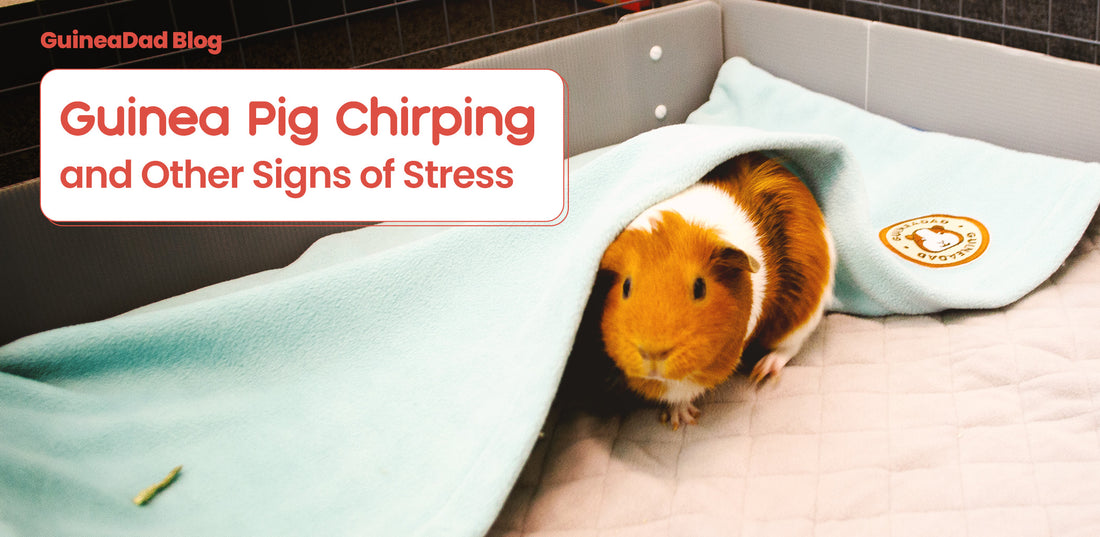












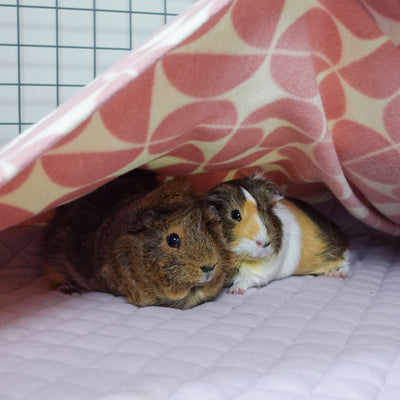
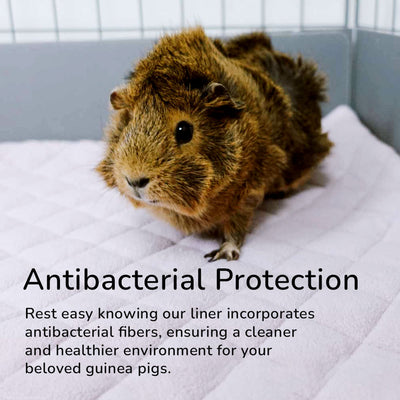
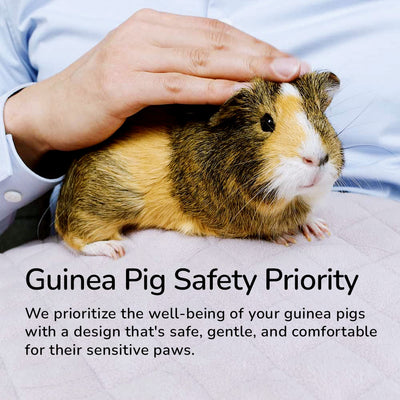








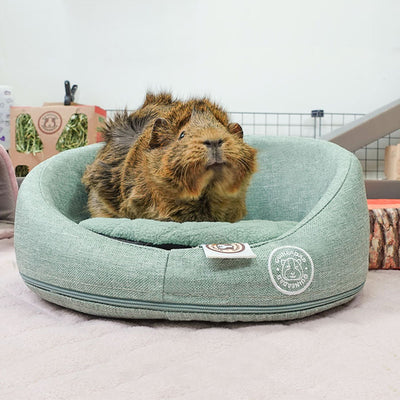
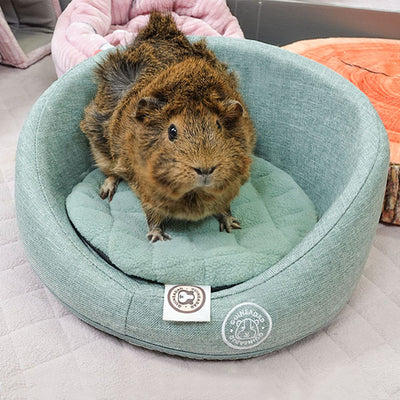


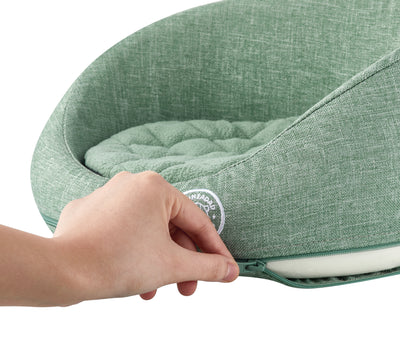


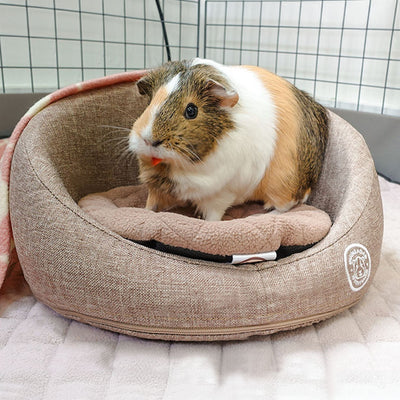
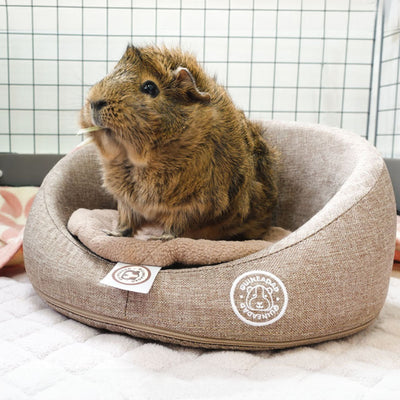





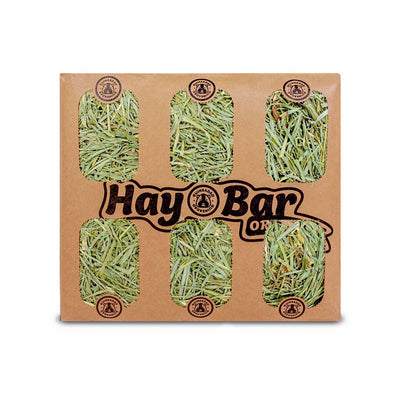
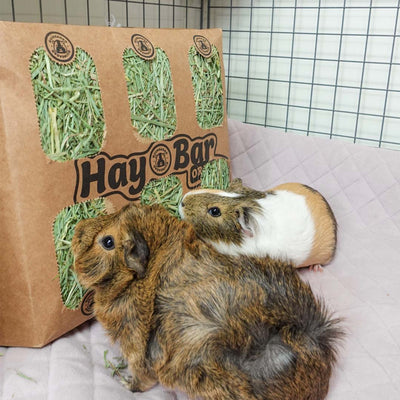

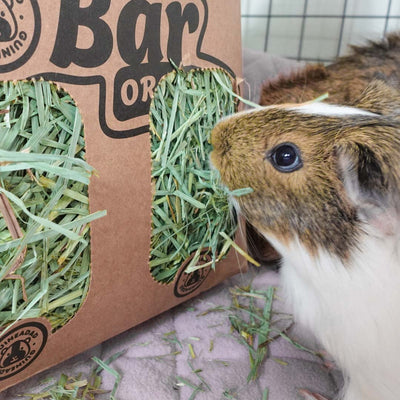
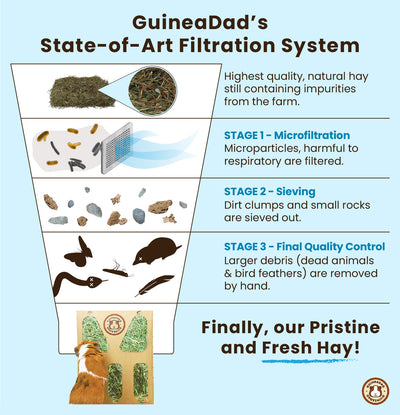

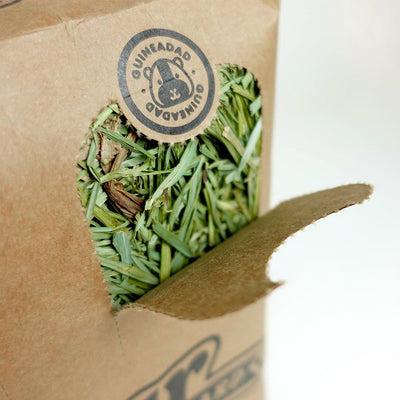
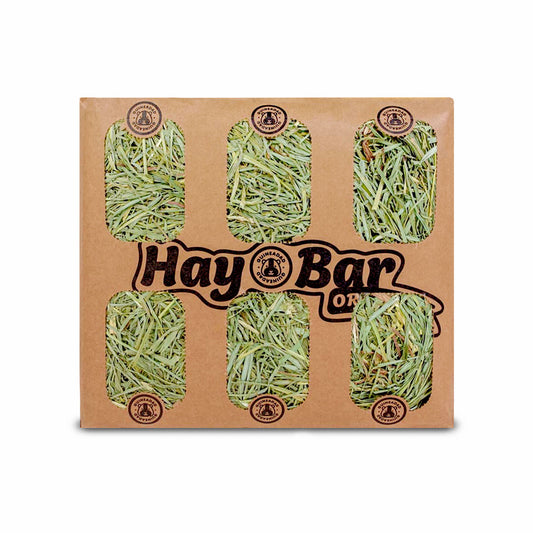

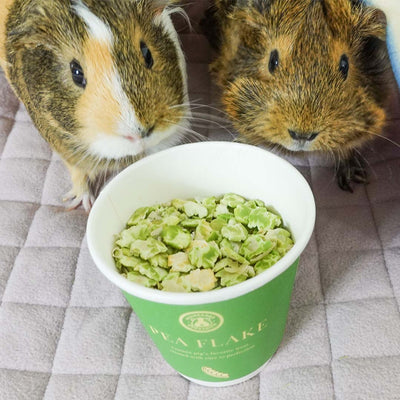
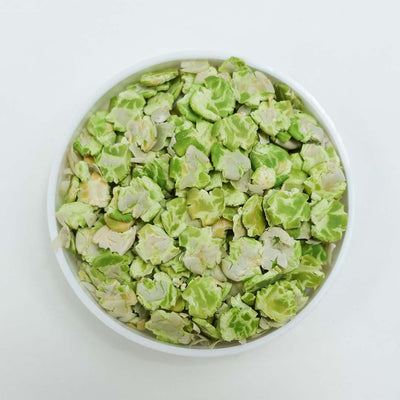
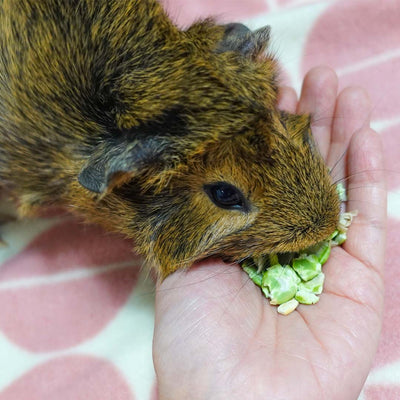
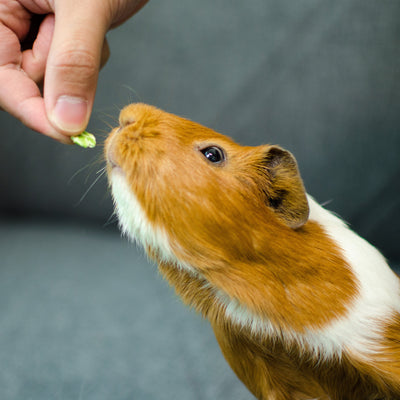



3 comments
We have a guinea pig that chirps like a bird! I’m not sure if it’s a sign of stress or what it means – but it’s the most amazing sound. The first time we heard it, we freaked out thinking somehow a bird had gotten in the house!
Hi Cecilia!
There are a few reasons that a guinea pig might chew on the bars of their cage. Since stress a common reason, we suggest looking for any additional behaviors that indicate stress, as well as any potential stressors in the environment (loud noises, excitable pets, etc.), and make sure that this piggy has a calm, safe, and private place she can retreat to when she needs.
Hunger, boredom, and pain are all other potential reasons a guinea pig may chew on their cage, so she may do better with a larger cage, more food pellets, or potentially a playmate (as guinea pigs do much better with other guinea pigs around). Lastly, we’d suggest checking that she’s eating normally, having regular poos, and that urination appears painless and is urine is free of any little white crystals. A regular gentle physical to check for any scratches, parasites, or sore spots is also a good practice.
We hope this gives you some tools, and please feel free to share this blog with your friends if you think it might help their piggy!
~GuineaDad
Hello! My friends guinea pig bites so much on the cage bars and they blame it on when she was little-she was still teething, but now, after reading one of your articles, it says she might be stressed or scared. What can I do to conform this? Also, if this the article is correct, how can I tell my friends and their poor guinea pig this?